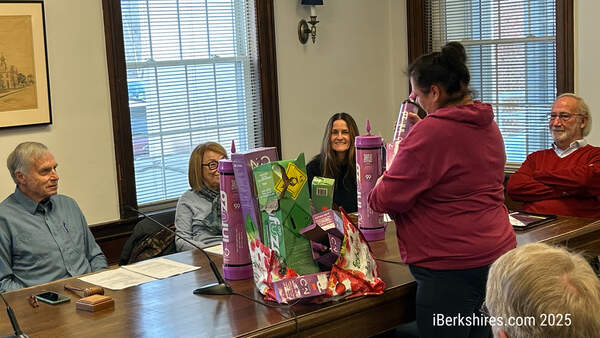Williams College Promotes Seven Faculty to Full Professor
 |
WILLIAMSTOWN, Mass. — Williams College has announced the promotion of seven faculty to full professorships, effective July 1, 2019.
They include Quamrul Ashraf, economics; Amy Holzapfel, theater; Sara LaLumia, economics; James Manigault-Bryant, Africana studies; Ngonidzashe Munemo, political science; Jason Josephson Storm, religion; and Amanda Wilcox, classics.
In addition, eight faculty have received new named chair positions: Elizabeth McGowan is the Robert Sterling Clark Professor of Art; Jon Bakija is the W. Van Alan Clark '41 Third Century Professor in the Social Sciences; David (Dukes) Love is the Class of 1969 Professor of Economics; Joy James is the Ebenezer Fitch Professor of Humanities; George (Sam) Crane is the Edward S. Greenbaum 1910 Professor of Political Science; Helga Duxes is the Paul H. Hunn ’55 Professor of Social Studies; Laylah Ali is the Francis Christopher Oakley Third Century Professor of Art; and Soledad Fox is the V-Nee Yeh '81 Professor of Spanish and Comparative Literature.
Quamrul Ashraf
Ashraf's areas of interest include economic growth and development, political economy, macroeconomics, economic demography, and agent-based computational economics. His work has been published in numerous academic journals, including the Journal of Economic Literature, Macroeconomic Dynamics, the Review of Economics and Statistics and the American Economic Review. A National Science Foundation award recipient, he has also won multiple research grants. He is a member of the college's Committee on Diversity and Community and currently serves as associate editor of the Journal of Economic Growth and Journal of Population Economics. He received his B.A. from Trinity College and his Ph.D. from Brown University.
Amy Holzapfel
Holzapfel is the author of "Art, Vision & Nineteenth-Century Realist Drama: Acts of Seeing" (Routledge, 2014), which explores how modern theories of vision in art and science impacted the rise of realism in theater. She has published articles in Contemporary Theatre Review, PAJ: A Journal of Performance and Art, The Journal of Dramatic Theory & Criticism, Modern Drama, and Theater, as well as chapters in various anthologies. Her current monograph-in-progress, The Commons of Tragedy: Democracy, Social Capital, and the Resurgence of the Chorus in Twenty-First Century Performance, traces the revitalization of the collective body of the tragic chorus as both a safeguard of democracy and resource for social capital. She has previously served as chair of the Theater Department, and she received her M.F.A. and D.F.A. in dramaturgy and dramatic criticism from the Yale School of Drama.
Sara LaLumia
LaLumia's areas of expertise include public economics and labor economics. She teaches courses on principles of macroeconomics and income distribution. Her work has been published in the National Tax Journal, Journal of Human Resources, Journal of Policy Analysis and Management, American Economic Journal: Economic Policy, and she has two current works in progress. She is a member of the Compensation Committee from Steering Committee as well the chair of the political economy program and the Committee on Priorities and Resources. In addition, she serves as co-editor of International Tax and Public Finance. She received her B.A. from Youngstown State University and her Ph.D. from the University of Michigan.
James Manigault-Bryant
Manigault-Bryant studies religious phenomena and the numerous cultural forms they take, particularly those that emerge from the experience of being African American. His recent projects include Signs of Damascus Road: The Call in the African-American Ministerial Imagination, which looks at processes of secularization that affect the lived experience of African American ministry, and On Black Metaphysics, a book-length proposal that uses African American religious thought to reimagine our lived terms of sociality. He has received generous research support from the Ford Foundation and the Virginia Foundation for the Humanities. He has served as chair of the Africana studies department and teaches courses on Time and Blackness, Race and the Environment, and The Plantation and Its Afterlife. He received his B.A. from Tulane University and his Ph.D. from Brown University.
Ngonidzashe Munemo
Munemo's research interests include famine studies and political violence, and he is currently looking at institutional choices and changes in the executive office among countries that democratized after 1970. Author of the book "Domestic Politics and Drought Relief in Africa: Explaining Choices," he has developed and taught many political science courses as well as taught in and directed the summer humanities and social science program. In addition to teaching, he is associate dean for institutional diversity and equity. He has also served as chair of the global studies program and as a member and chair of both the Faculty Steering Committee and the Committee on Academic Standing, as a member of the Faculty Review Panel, Faculty Compensation Committee, and College Environmental Advisory Committee. He received his B.A. from Bard College and his Ph.D. from Columbia University.
Jason Josephson Storm
Storm's primary research interests include Japanese religions, European intellectual history and theory. Trained in East Asian philosophy and Francophone poststructuralism, he also explores new research models for religious studies. He is the author of the award-winning book "The Invention of Religion in Japan" (University of Chicago Press, 2012) and "The Myth of Disenchantment: Magic, Modernity, and the Birth of the Human Sciences" (University of Chicago Press, 2017). He is currently completing a book length manuscript Metamodernism: The Future of Theory after Postmodernism. He has served as chair of the religion department and the science and technology studies program, and he teaches courses on the meaning of life, Japanese religions and the state and the death of God. He received his M.T.S. from Harvard University and his Ph.D. from Stanford University.
Amanda Wilcox
Wilcox's research interests include Latin literature of the late republic and early empire, Roman cultural history—especially gender studies and intellectual history—Greek literature, and ancient Greek philosophy. She is a chair of the Faculty Steering Committee and teaches courses on Ovid's metamorphoses, intermediate latin and Roman literature. Author of the book "The Gift of Correspondence in Classical Rome: Friendship in Cicero’s Ad Familiares and Seneca’s Moral Epistles" (University of Wisconsin Press, 2012), her writing has been published in the American Journal of Philology, Helios, and Phoenix. She has previously served as chair of the classics department. She received her B.A. from Reed College and her Ph.D. from the University of Pennsylvania.
Tags: Williams College,















